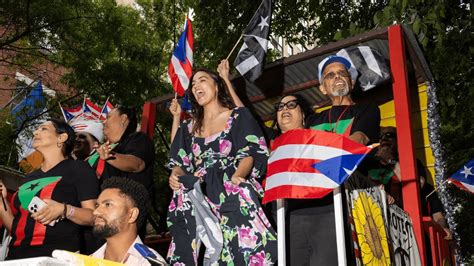
Laura Loomer ignited a firestorm of criticism after appearing at New York City’s Puerto Rican Day Parade and making disparaging remarks about Representative Alexandria Ocasio-Cortez’s physical appearance, sparking widespread condemnation online.
Conservative political activist Laura Loomer drew intense backlash after she body-shamed Representative Alexandria Ocasio-Cortez (AOC) at the Puerto Rican Day Parade in New York City on Sunday, June 9th, prompting widespread outrage across social media platforms. Loomer, known for her far-right views and controversial stunts, targeted Ocasio-Cortez with demeaning comments about her weight and appearance, which many critics deemed to be a blatant act of harassment and misogyny. The incident immediately went viral, drawing condemnation from fellow politicians, commentators, and ordinary citizens alike.
Loomer’s actions were captured in videos and photos that quickly spread across various social media platforms, including X (formerly Twitter), Instagram, and Facebook. In these posts, Loomer can be seen holding signs and shouting insults directed at Ocasio-Cortez, who was not present at the parade. The derogatory nature of her comments, combined with the public setting, amplified the controversy and intensified the calls for her to be held accountable.
The incident comes against a backdrop of increasing political polarization and heightened tensions surrounding public figures, particularly women in politics. Loomer’s targeting of Ocasio-Cortez highlights the challenges faced by female politicians who are often subjected to disproportionate levels of scrutiny and personal attacks based on their appearance or personal lives.
The fallout from Loomer’s actions was swift and far-reaching. Social media users flooded her accounts with messages of condemnation, accusing her of engaging in body-shaming and perpetuating harmful stereotypes. Many called for her to be banned from social media platforms for violating their policies against harassment and hate speech. Several prominent figures in politics and media also weighed in on the controversy, denouncing Loomer’s behavior and expressing solidarity with Ocasio-Cortez.
This is not the first time Loomer has been embroiled in controversy. She has a long history of making inflammatory statements and engaging in provocative actions that have drawn criticism from both sides of the political spectrum. She has previously been banned from several social media platforms, including X, Facebook, and Instagram, for violating their policies against hate speech and misinformation. Her actions have often been seen as attempts to gain attention and generate publicity, even at the expense of others.
The incident at the Puerto Rican Day Parade has reignited the debate over the role of social media platforms in regulating harmful content and holding individuals accountable for their online behavior. Critics argue that social media companies have a responsibility to protect their users from harassment and abuse, while others maintain that platforms should not censor or restrict free speech, even when it is offensive or unpopular.
Details of the Incident
According to reports, Loomer positioned herself along the parade route in New York City, holding signs with messages critical of Ocasio-Cortez. She also used a megaphone to shout insults and derogatory comments about the congresswoman’s physical appearance. Videos of the incident show Loomer repeatedly referring to Ocasio-Cortez’s weight and making disparaging remarks about her body.
“AOC is a fat, ugly commie,” Loomer was heard shouting in one video, according to multiple reports. She also reportedly made other offensive comments about Ocasio-Cortez’s appearance, which were widely condemned as being inappropriate and unacceptable.
The Puerto Rican Day Parade is an annual celebration of Puerto Rican culture and heritage, attracting hundreds of thousands of participants and spectators. Many viewed Loomer’s actions as disrespectful and disruptive, as they detracted from the celebratory atmosphere and injected a toxic element of personal attacks into the event.
Social Media Backlash
The incident quickly went viral on social media, with users from all walks of life expressing their outrage and disgust at Loomer’s behavior. The hashtag #LauraLoomer was trending on X, with thousands of tweets condemning her actions and calling for her to be held accountable.
Many users accused Loomer of engaging in body-shaming, which is the act of criticizing or making negative comments about someone’s physical appearance. Body-shaming can have a devastating impact on a person’s self-esteem and mental health, and it is widely recognized as a form of harassment and bullying.
Others criticized Loomer for engaging in misogyny, which is the hatred of or prejudice against women. They argued that her attacks on Ocasio-Cortez’s appearance were motivated by sexism and a desire to demean and belittle a powerful female politician.
Several prominent figures in politics and media also weighed in on the controversy, denouncing Loomer’s behavior and expressing solidarity with Ocasio-Cortez.
“Laura Loomer’s body-shaming of AOC is disgusting and unacceptable,” tweeted one Democratic lawmaker. “This kind of hateful rhetoric has no place in our society.”
“I stand with AOC against these vile attacks,” wrote a prominent media commentator. “We must all condemn body-shaming and misogyny whenever we see it.”
Loomer’s Response
In response to the widespread criticism, Loomer defended her actions and doubled down on her attacks on Ocasio-Cortez. She claimed that she was simply exercising her right to free speech and that her comments were not intended to be harmful.
“I have a right to express my opinion about AOC,” Loomer wrote on X. “She is a public figure, and she is not above criticism.”
Loomer also accused her critics of being “triggered snowflakes” who were trying to silence her for speaking the truth. She maintained that her comments were not body-shaming but rather a legitimate critique of Ocasio-Cortez’s policies and political views.
However, her defense was met with skepticism and further condemnation. Many argued that her comments were clearly intended to be hurtful and demeaning and that they had nothing to do with legitimate political debate.
Previous Controversies
The incident at the Puerto Rican Day Parade is just the latest in a long line of controversies involving Laura Loomer. She has a history of making inflammatory statements and engaging in provocative actions that have drawn criticism from both sides of the political spectrum.
In the past, she has been banned from several social media platforms, including X, Facebook, and Instagram, for violating their policies against hate speech and misinformation. She has also been criticized for making anti-Muslim comments and for spreading conspiracy theories.
In 2018, Loomer handcuffed herself to the door of Twitter’s New York headquarters in protest of her ban from the platform. She claimed that Twitter was censoring her and suppressing her free speech.
Her actions have often been seen as attempts to gain attention and generate publicity, even at the expense of others. Critics argue that she thrives on controversy and that she deliberately seeks out opportunities to provoke outrage and generate headlines.
The Broader Context
The controversy surrounding Laura Loomer’s actions at the Puerto Rican Day Parade highlights the broader challenges faced by women in politics and the increasing polarization of American society.
Women in politics are often subjected to disproportionate levels of scrutiny and personal attacks, particularly based on their appearance or personal lives. This can make it difficult for women to enter and succeed in politics, and it can also discourage other women from pursuing political careers.
The incident also reflects the growing polarization of American society, with political discourse becoming increasingly divisive and uncivil. Personal attacks and insults have become increasingly common in political debates, making it difficult to have productive conversations about important issues.
The Role of Social Media
The controversy has also reignited the debate over the role of social media platforms in regulating harmful content and holding individuals accountable for their online behavior.
Critics argue that social media companies have a responsibility to protect their users from harassment and abuse. They maintain that platforms should have clear policies against body-shaming, hate speech, and other forms of harmful content, and that they should enforce those policies effectively.
Others argue that social media platforms should not censor or restrict free speech, even when it is offensive or unpopular. They maintain that platforms should allow users to express their opinions freely, as long as they are not inciting violence or engaging in illegal activity.
The debate over the role of social media is complex and multifaceted, with no easy answers. However, it is clear that social media platforms have a significant impact on public discourse and that they have a responsibility to address the challenges of harmful content and online harassment.
Potential Legal Ramifications
While it’s unclear if Loomer’s actions will result in legal repercussions, experts suggest her behavior could potentially constitute harassment or incitement, depending on the specific wording and context of her statements. If Ocasio-Cortez felt threatened or reasonably feared for her safety as a result of Loomer’s actions, she could potentially pursue legal action. However, such cases are often complex and depend on proving intent and a credible threat.
The Impact on Political Discourse
The incident underscores the deteriorating state of political discourse, where personal attacks and insults are increasingly used as substitutes for substantive debate. This type of behavior not only degrades the political environment but also discourages thoughtful engagement and critical thinking. The focus shifts from policy issues to personal animosity, making it harder to find common ground and address the challenges facing society.
The Future of Political Activism
Loomer’s actions raise questions about the future of political activism and the boundaries of acceptable behavior in public discourse. While passionate advocacy and dissent are essential components of a healthy democracy, they must be exercised in a way that respects the dignity and safety of others. When activism crosses the line into personal attacks and harassment, it undermines the very principles it seeks to promote.
The Importance of Media Literacy
In an age of social media and online echo chambers, it’s more important than ever to cultivate media literacy skills. This includes the ability to critically evaluate information, identify bias, and distinguish between facts and opinions. By becoming more discerning consumers of news and information, individuals can help to combat the spread of misinformation and promote a more informed and responsible public discourse.
Conclusion
Laura Loomer’s body-shaming of Alexandria Ocasio-Cortez at the Puerto Rican Day Parade has sparked widespread outrage and condemnation. The incident highlights the challenges faced by women in politics, the increasing polarization of American society, and the debate over the role of social media in regulating harmful content. It also underscores the importance of promoting a more civil and respectful political discourse, where personal attacks are replaced by substantive debate. Loomer’s actions serve as a stark reminder of the need for greater accountability and responsibility in online behavior, and the importance of cultivating media literacy skills in an age of misinformation and echo chambers. The incident is likely to have a lasting impact on the political landscape, further fueling the debate over free speech, social media regulation, and the boundaries of acceptable behavior in public discourse.
Frequently Asked Questions (FAQ)
1. What exactly did Laura Loomer do at the Puerto Rican Day Parade?
Laura Loomer attended the Puerto Rican Day Parade in New York City and made disparaging comments about Representative Alexandria Ocasio-Cortez’s physical appearance, including shouting insults and holding signs with derogatory messages.
2. Why is Loomer’s behavior considered controversial?
Her behavior is considered controversial because it is widely viewed as body-shaming, misogynistic, and disrespectful. Many argue that her personal attacks on Ocasio-Cortez’s appearance are inappropriate and have no place in political discourse.
3. What has been the reaction on social media to the incident?
The reaction on social media has been overwhelmingly negative, with users from all walks of life condemning Loomer’s actions. The hashtag #LauraLoomer trended on X, with thousands of tweets criticizing her behavior and calling for her to be held accountable.
4. Has Laura Loomer faced similar controversies in the past?
Yes, Laura Loomer has a history of making inflammatory statements and engaging in provocative actions that have drawn criticism from both sides of the political spectrum. She has been banned from several social media platforms for violating their policies against hate speech and misinformation.
5. What is the broader significance of this incident?
The incident highlights the challenges faced by women in politics, the increasing polarization of American society, and the debate over the role of social media in regulating harmful content. It also underscores the importance of promoting a more civil and respectful political discourse, where personal attacks are replaced by substantive debate.









